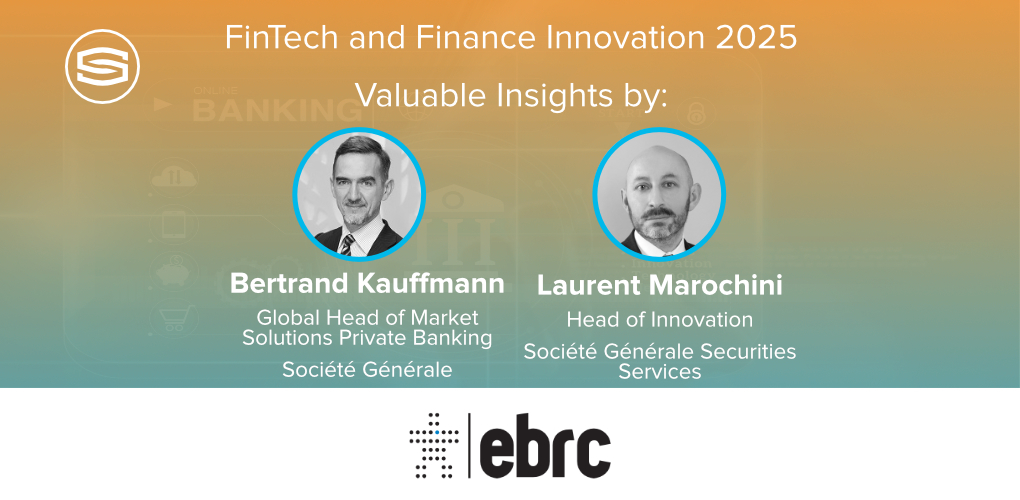
Insights & Opinions
FinTech and Finance Innovation 2025: Insights by Bertrand Kauffmann and Laurent Marochini of Société Générale
Wed, 19 Jan 2022


The securities and asset management business are vital to Luxembourg's financial market. It is no surprise that our two experts of Société Générale listed everything related to funds and asset management as the most promising domains of fintech in the coming future for Luxembourg.
The conversation was part of the research for EBRC and the resulting report "Finance and FinTech Innovation 2025 – Hybridisation Designs the Future of the Finance Industry".
The experts were Bertrand Kauffmann, Global Head of Market Solutions Private Banking at Société Générale Luxembourg and Laurent Marochini, Head of Innovation at Société Générale Sécurities Services.
The new gold in financial technology
The financial services sector is a traditional industry. Yet 'digital' is what drives change, today even more than before the pandemic. "People who were known as very sceptical certainly have moved the digitisation process on top of their agenda", Bertrand explained.
He continued by saying that digitisation goes beyond customer interaction. The data opportunities, the rise of artificial intelligence and blockchain will mature, and financial institutions will find the right combinations that add value to their organisation.
Bertrand: "We’re still looking for use cases around blockchain. That is something that will be further developed and discussed. The combination of blockchain and securities will be interesting to follow up in the context around confidentiality”.
Luxembourg is the biggest European investment fund centre in Europe, the second-biggest worldwide, explained Laurent. This small country attracted many startup companies with a strong focus on adding value to the funds industry and all its stakeholders.
Specifically looking at technology, Laurent sees AI, blockchain and cybersecurity as the most promising domains, especially with ESG so high on everyone’s agenda these days.
Laurent: “In the future, successful models will combine different technologies, as you said, artificial intelligence with blockchain, blockchain with cybersecurity. Just look at ESG, where you need to monitor data, so you need to secure data. This requires solutions for traceability, where you can use blockchain. In the Luxembourg Blockchain Lab, 8 to 10 startups are working on ESG elements”.
Having third-party FinTech companies with unique solutions, intelligent people, and an agile corporate culture as a partner can augment innovation in banks. There is a win-win, though. The other way around, Bertrand noted that banks bring value to the table in this kind of partnership, like the expertise in regulation, compliance and very specific knowledge in financial services.
The ingredient list for successful FinTech startups
A recipe for a successful startup has a list of 4 essential ingredients, according to Laurent, the first one being: the capacity to collaborate. Banks and FinTech companies think different. They have different visions and different languages. FinTech companies that can overcome this have a head start to be successful. This is where programs like “Powered by EBRC”, or incubator programs at Société Générale add tremendous value, as they connect FinTech companies with the right mentor to overcome these challenges.
The second ingredient on Laurent’s list is the capacity to talk to the decision-maker in the organisation that this FinTech tries to sell its solution. These decision-makers may not buy the solution directly, but they are a critical stakeholder in the decision process.
The third ingredient on the list is to have the first clients onboarded. The reason is threefold, according to Laurent: (a) their feedback helps to improve the product; (b) they help to promote the product and (c) they demonstrate to be a trusted partner.
Last but not least is the importance of liquidity. Liquidity is a blood of a living organisation. Without blood, there is no living, no survival. Startups need cash to develop products and to demonstrate longer-term viability.
Linked to that, Laurent gave the following advice: “You need to choose your partners wisely. It is your investor that will drive the strategy of your company. Don’t select the first investor on your road but select the right one: your investor of today will be your strategic advisor of tomorrow”.
Société Générale is an example of such an investor. They have a corporate venture capital fund of 150 million to support the brightest external ideas. Shine, Treezor and Reezocar are examples of recent acquisitions, explained Bertrand.
Through incubator programs like #LePlateauLUX, they support local startups. They have many more similar international initiatives to foster innovation and find valuable partners to build the future of finance together.
If you like to know more, we recommend you to read the white paper “Finance and Fintech Innovation 2021 – Hybridisation Designs the Future of the Finance Industry”, including insights of Bertrand Kauffmann, Laurent Marochini and many more key stakeholders of the Luxembourg finance industry.
If you would like to know more, we recommend that you read the white paper "Finance and FinTech Innovation 2025 – Hybridization Designs the Future of the Finance Industry", including insights of Bertrand Kauffmann, Laurent Marochini and many more key stakeholders of the Luxembourg finance industry.
More articles of different contributors to this study can be found here.
At The Banking Scene Conference 2022 Luxembourg on February 22nd, you get the chance to join the conversation. Together, we investigate how banks should pivot their role in society to continue being trusted partners for their stakeholders in the future.